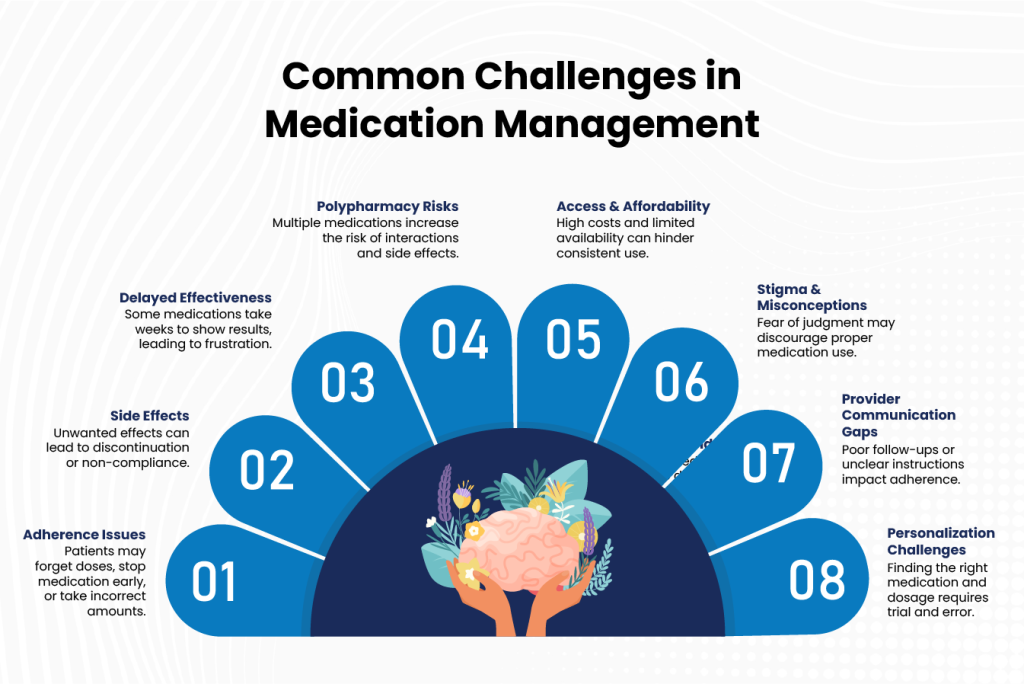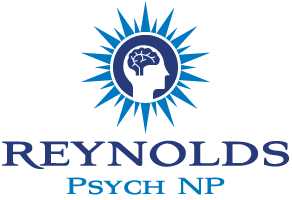Having challenges in medication management for your mental wellness? Really, you are not alone! The process of managing mental health medications proves difficult to handle. Patients face difficulties with medication adherence due to forgetfulness, side effects, and incorrect dosages.
The combination of inadequate guidance and bad healthcare-provider interactions creates extra difficulties for medication management issues. Many digital tools exist to help manage medications, yet several obstacles remain unaddressed.

10 Common Challenges in Medication Management for Mental Health
1. Forgetting to Take Medications
The failure to remember doses remains the largest barrier to successful medication management practice. Several factors, including hectic workloads and concentration difficulties, as well as intellectual impairment, lead patients to miss their prescribed medicines.
A person’s inconsistent medication schedule both diminishes drug effectiveness and allows symptoms to grow worse. The combination of medicine alarm timers and digital tools for medication management helps to improve patient medicine adherence. Person-focused reminder systems both improve medications’ regular use and improve mental health results.
2. Managing Side Effects
The challenges in medication management become frustrating because of adverse effects that affect many patients. Patients quit taking medications because of discomfort, although they have not received medical advice.
Not giving attention to drug side effects may result in treatment inefficacy as well as medical complications. Professionals and patients need direct conversations to handle symptoms properly. The monitoring of side effects assists healthcare providers in creating more effective treatment plans.
3. Adhering to Prescribed Dosages
Proper medication dosage stands as a vital factor when dealing with challenges in medication management.
- The Risks of Incorrect Dosages: Medical non-response develops when dose levels deviate from the prescriptive range to either a lower or higher extent.
- Self-Adjusting Medications: When patients change their medication without healthcare professional input they harm their healthcare condition.
- Importance of Regular Monitoring: Medical examinations help physicians confirm that medications operate according to their intended purpose.
- Building a Routine: Regular doctor visits allow patients to sustain proper medication dosage along with better adherence rates.
- Professional Guidance: Healthcare providers maintain central importance in securing patients’ proper dose management.
4. Poor Communication with Healthcare Providers
A lack of proper communication results in significant problems in medication management. The unwillingness of patients to express their concerns results in unsuitable medication treatment. This communication gap directly leads to major challenges in medication management.
Doctors require reliable information from patients to modify drug doses effectively. Treatment quality improves through open communication between patients and healthcare providers. Medication adherence, along with better health results, becomes possible with clear patient-provider dialogue.
5. Medication Interactions
The challenges in medication management become dangerous when patients lack knowledge about drug interactions. Combining medications can lead to serious adverse effects. Many patients unintentionally mix their prescribed medications with vitamins and other over-the-counter drugs.
Healthcare workers should teach patients about medication risks that could exist. The combination of education and close observation stops dangerous drug effects from occurring. Awareness and attentiveness: your strongest protection against medication errors.
6. Accessibility and Affordability Issues
The expensive nature of medications leads to difficulties in managing medications among numerous patients.
- Financial Barriers: Prescription costs present challenges for some patients, resulting in skipped doses or the need for substitute treatments.
- Pharmacy Access Issues: A scarcity of pharmacy access leads to problems in maintaining regular drug intake schedules.
- Insurance and Assistance Programs: Wealthy individuals with these programs have improved financial stability and better ability to follow medical recommendations.
- Cost-Effective Alternatives: Generic medications and discount programs provide available savings alternatives.
- Ensuring Consistent Access: Individuals who seek assistance from their healthcare providers will find solutions to their affordability issues.
7. Psychological Barriers to Medication Adherence
People with negative attitudes and personal beliefs face difficulties in their medication management process. Some fear dependency, while others feel ashamed of their condition. Your exposure to incorrect information creates doubts about the rightness of taking drugs that doctors have ordered.
To assist with medication issues, educate patients on solutions for difficulties in resolving the challenges in medication management. A supportive environment conditions people to take medication properly. Dismantle the obstacles: comprehension is the initial move toward compliance.
8. Transitioning Between Medications
Patients encounter severe challenges when transitioning between different medications because of their medication management problems. Changes in medication produce diverse side effects together with withdrawal symptoms and emotional restlessness, which makes transitions unreasonably difficult.
Patients can suddenly end their treatments when they receive no guidance from healthcare providers. Strict medical oversight provides people with a better transition period. The implementation of gradual over time reduces negative side effects and overcomes the challenges in medication management.
9. Difficulty Tracking Multiple Medications
The requirement for handling a large number of prescribed medications generates additional challenges in medication management.
- Confusion in Dosage and Timing: Current patients have problems maintaining a clear understanding of all their medication dosages.
- Risk of Skipped or Double Doses: The improper handling of medications results in both incorrect medicine administration and excess medication usage.
- The Role of Digital Tools for Medication Management: Digital tracking becomes simpler by means of mobile applications and reminder features that provide notification services.
- Medication Logs and Organizers: The practice of documenting medications correctly supports better patient compliance with drug regimens.
- Simplifying Medication Schedules: The plan becomes more manageable when healthcare providers serve as consultation partners.
10. Lack of Personalized Medication Plans
The use of generic prescriptions produces medication management issues since they do not meet every patient’s requirements. Medical interventions deliver improved treatment effectiveness through patient-specific care planning.
Regular assessment leads to maintaining the best possible drug dosage levels. Customized medical plans assist in reducing negative reactions to drugs. The integration of individual treatment methods leads to better outcomes in mental health restoration.
Related Articles:
- Medication Management in Mental Health
- Right Psychiatric for Individual Counseling
- Psychotherapy for Introverts
Final Thoughts
The process of medication management needs patient persistence along with proper guidance and suitable tools. Medical-provider interactions enable patients to receive safe and effective medical treatment. Digital tools that manage medication help patients adhere better while providing easy monitoring functions.
Reynolds Psych NP works as an expert to assist patients through their challenges in medication management. By taking a personalized approach, they ensure that patients both follow their treatment correctly and need appropriate changes made to it.
Establishing regular medicine schedules leads to both improved mental condition and prolonged medical recovery outcomes. Electronic tools in medication management ensure smooth prescription monitoring through their advanced features.
Their comprehensive care assists patients in managing medications efficiently for improved mental well-being. For more details, email [email protected] OR contact: (262) 999-7350.
FAQs:
What are the common issues in mental medication management?
The key barriers to successful medication use include absent-mindedness along with unwanted effects and high costs coupled with inadequate healthcare provider communication.
How can I better learn to stick to my medicine regimen?
Digital tools for medication management combined with reminders should be used alongside doctor communication.
What steps should I take to tackle the side effects of medication?
Before altering your prescription, you must contact your healthcare provider.
How are digital tools effective in keeping track of medications?
Application programs, together with alert systems, help patients manage their medication dosage schedule.
Why is it important to keep your doctor updated about your medication progress?
The practice of open communication permits the safe administration of medications with the prevention of drug interactions to deliver enhanced treatment results.
How does the Reynolds Psych NP address challenges in medication management?
Reynolds Psych NP provides custom treatment approaches alongside medication oversight while guiding patients to follow their prescriptions more effectively.







